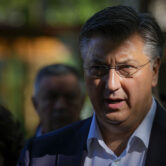By RACHEL ZOLL and NICOLE WINFIELD
VATICAN CITY (AP) — Cardinal Bernard Law, the disgraced former archbishop of Boston whose failures to stop child molesters in the priesthood sparked what would become the worst crisis in American Catholicism, died early Wednesday, the Vatican said. He was 86.
Law had been sick and was recently hospitalized in Rome.
Law was once one of the most important leaders in the U.S. church. He broadly influenced Vatican appointments to American dioceses, helped set priorities for the nation's bishops and was favored by Pope John Paul II.
But in January 2002, The Boston Globe began a series of reports that used church records to reveal that Law had transferred abusive clergy among parish assignments for years without alerting parents or police. Within months, Catholics around the country demanded to know whether their bishops had done the same, a scandal that was recounted in detail by the Oscar-winning film "Spotlight."
Law's successor as archbishop, Cardinal Sean O'Malley, said Wednesday it was a "sad reality" that Law's legacy will forever be tied to the abuse scandal since he led the Boston archdiocese at a time "when the church seriously failed" in its job to care for its flock and protect children.
"I offer my sincere apologies for the harm they suffered, my continued prayers and my promise that the archdiocese will support them in their effort to achieve healing," O'Malley said in a statement.
Law tried to manage the mushrooming scandal in his own archdiocese by first refusing to comment, then apologizing and promising reform. But thousands more church records were released describing new cases of how Law and others expressed more care for accused priests than for victims. Amid a groundswell against the cardinal, including rare public rebukes from some of his own priests, Law asked to resign and the pope said yes.
"It is my fervent prayer that this action may help the archdiocese of Boston to experience the healing, reconciliation and unity which are so desperately needed," Law said when he stepped down as head of the Boston archdiocese in December 2002. "To all those who have suffered from my shortcomings and mistakes, I both apologize and from them beg forgiveness."
It was a stunning fall from grace for Law and a rare step for the church, which deeply resists public pressure but could no longer hold out given the scope of the crisis. Since 1950, more than 6,500, or about 6 percent of U.S. priests, have been accused of molesting children, and the American church has paid more than $3 billion in settlements to victims, according to studies commissioned by the U.S. bishops and media reports. As the leader of the archdiocese at the epicenter of the scandal, Law remained throughout his life, and now in death, a symbol of the church's widespread failures to protect children.
Still, Law retained some support in the Vatican. In 2004, he was appointed archpriest of the Basilica of St. Mary Major, one of four principal basilicas in Rome. When John Paul died the next year, Law was among bishops who presided at a memorial Mass for the pontiff in St. Peter's Basilica. Law also continued for several years to serve in Vatican dicasteries, or policy-making committees, including the Congregation for Bishops, which recommends appointments to the pope. Advocates for victims saw the posts as a tone-deaf sign of favor for Law by church officials unrepentant about abused children.








